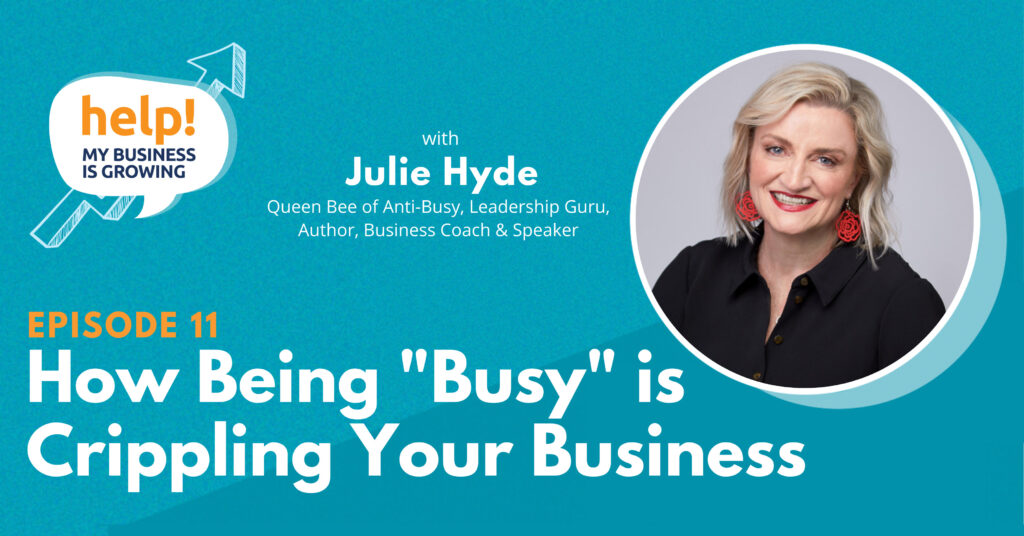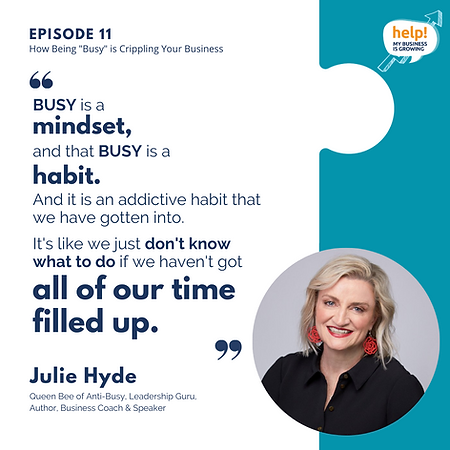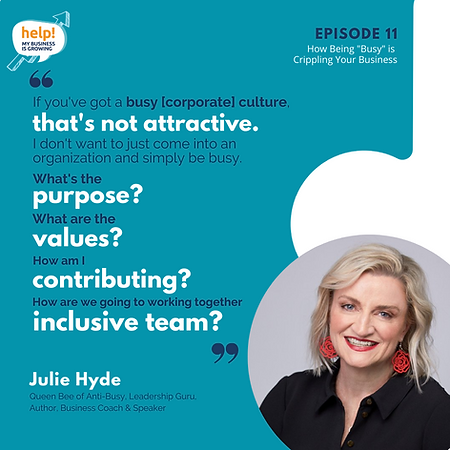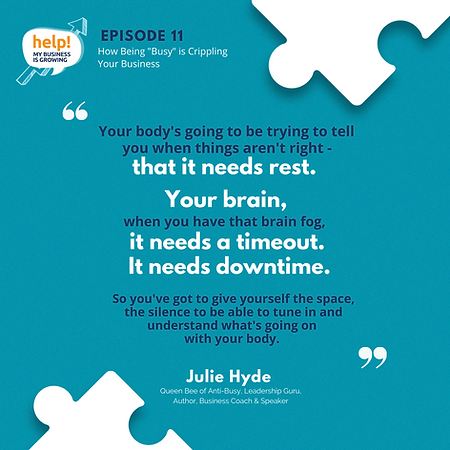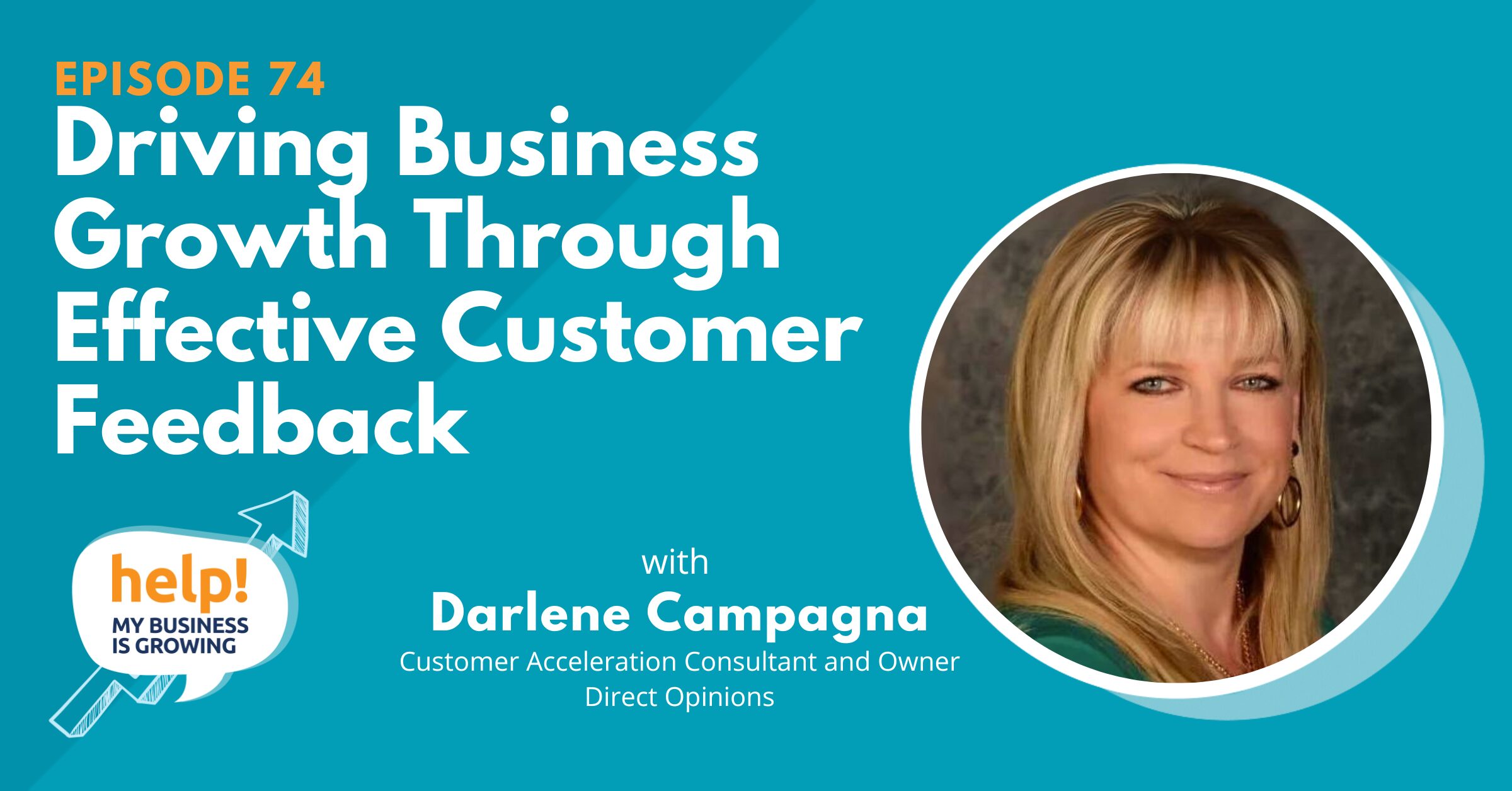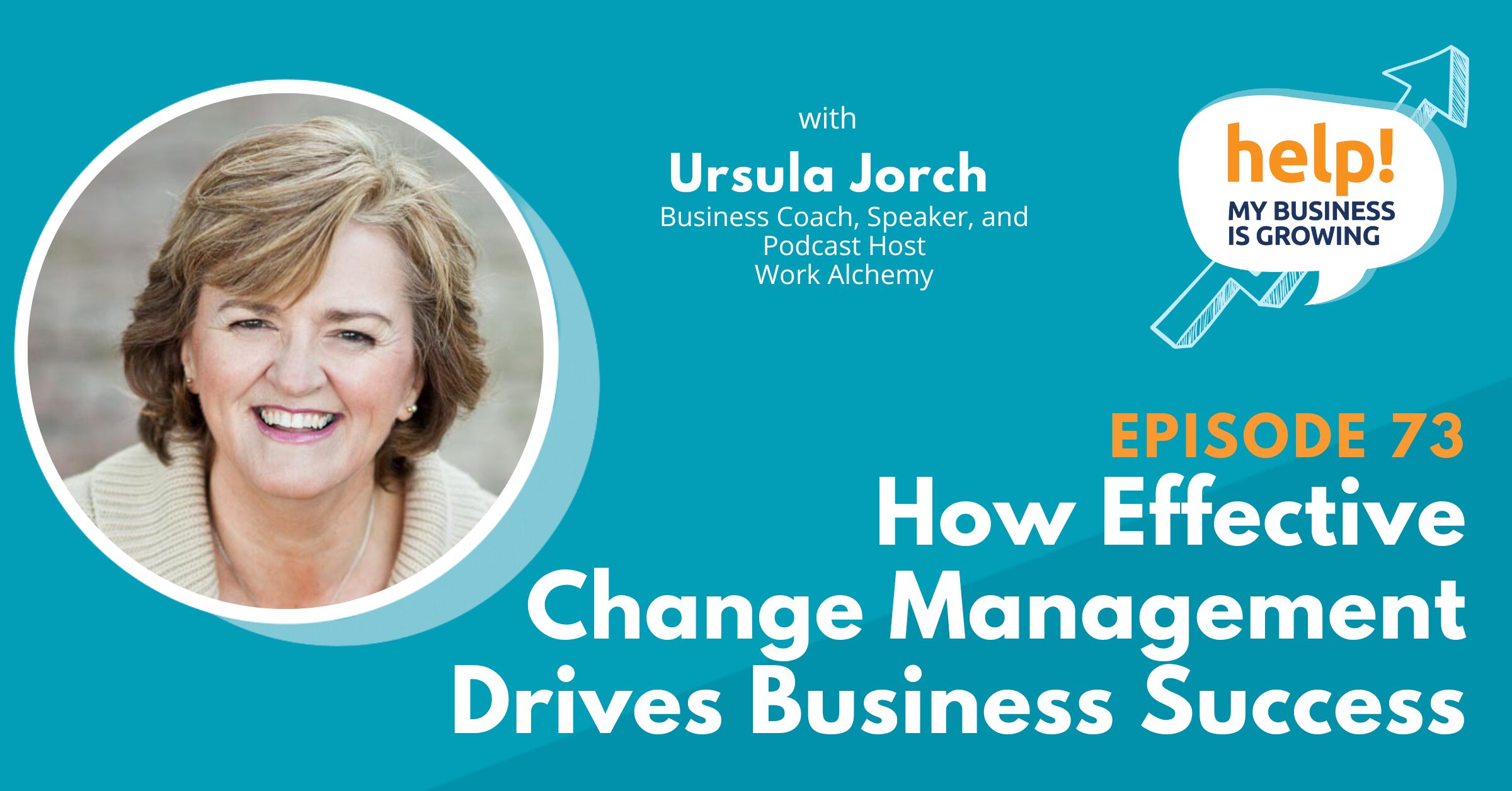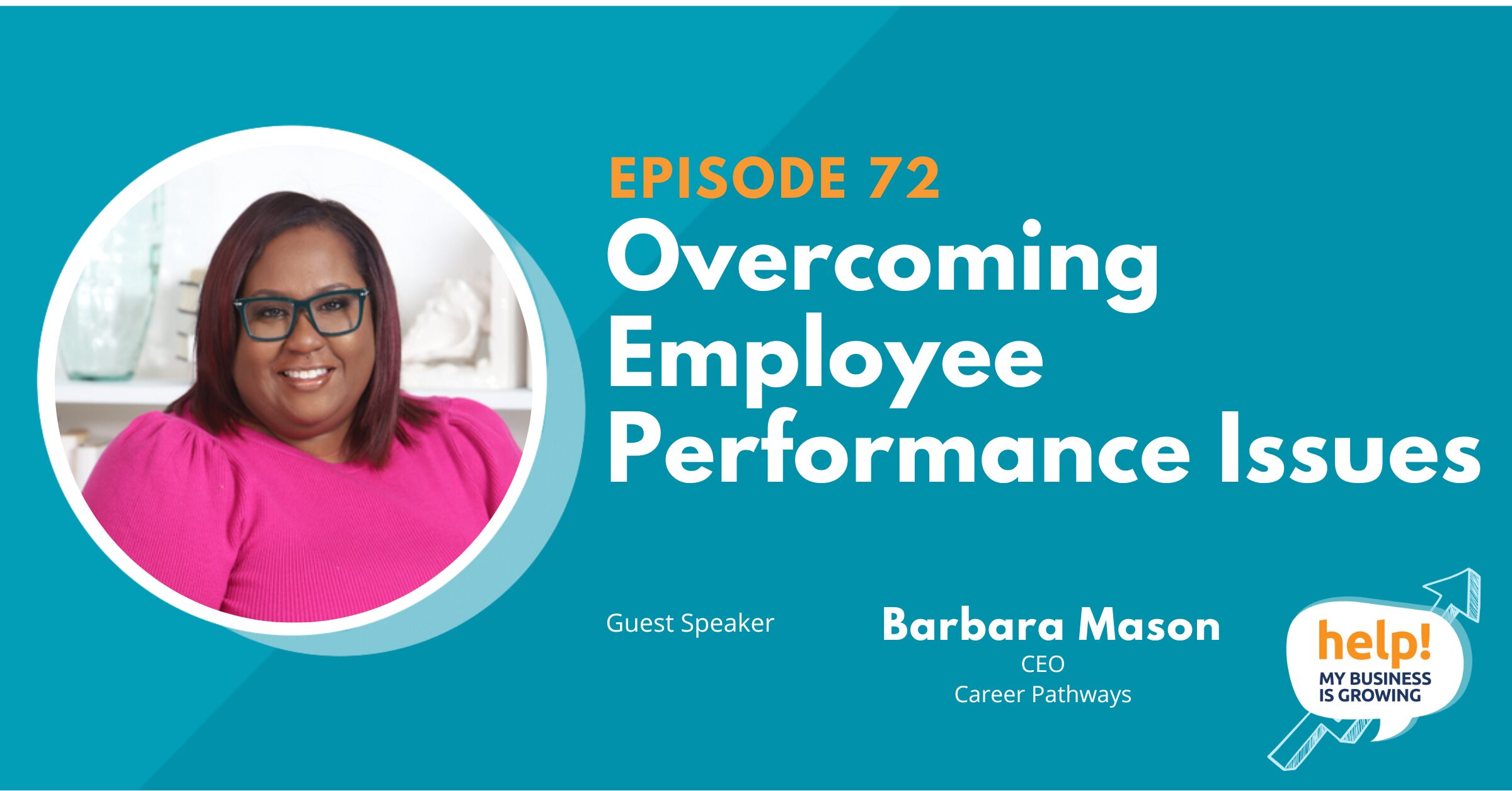It feels good at first to look at your business and see your team like a hive of busy bees, working diligently away – until the seemingly never-ending parade of work begins to get stressful, feel toxic, and disheartening.
Everyone feels pressed for time while struggling to complete (sometimes even to get started on) meaningful work that will provide value to the business. You might feel stuck, constantly running on a hamster wheel of busyness, with all the back-to-back meetings, little side tasks, and more, and you can’t get out.
They might no longer contribute their skills and talents to grow your business. Drops in productivity can also set your company back thousands or millions in annual revenue.
So what can we as leaders do to help our team focus on and keep track of meaningful work and break away from being constantly “crazy busy”?
Today’s episode is a jam-packed 35 minutes of life-changing tips and insights on how to bust the busy and start having the business (and life) that’s really going to support you where you want to be.
We are always busy, and if it is all we do, we’ll end up getting stuck and not knowing anything else.
There are two reasons why being busy is so addictive. One, it makes us feel significant. Two, we also attach our success to busyness rather than attaching success to the outcome or what we have achieved.
Many entrepreneurs, particularly startups and growing businesses, feel that you always need to be “ON” and have an ongoing epic project in the mix.
Sadly, this is the perfect example of not working smart, just working harder, and not being strategic. It can lead to burnout and is not sustainable.
Taking time out is a powerful tool that enables our brain to reflect and make sense of what’s going on. The brain can then create meaning and learnings, allowing you to make educated decisions in your business.
Simply take a break every 20 minutes away from the screen. For example:
Microbreaks enable you to do much more meaningful work since it prevents fatigue which really kills productivity.
Kathy (host):
Welcome back to Help! My Business is Growing, a podcast where we explore how to grow and build a business that is healthy and sustainable. I’m your host, Kathy Svetina. This episode, Episode 11, is a part of a trilogy on productivity. Episodes 10 to 12 are all about productivity, but looking at it from different angles and from different perspectives.
Kathy (host):
In the previous episode, Episode 10, my guest was Dawn O’Connor. And we explored how being productive and working are actually two different things. Dawn also gave us specific tools that you can implement in your work that will actually make you productive, not just busy. So in this episode, Episode 11, we’re going to look more into this busyness in the context of being reactive and stuck in the doing, because I’m sure that you know that feeling that even though you’re working, but it constantly feels like you’re behind, it’s a terrible place to be, and it’s a sure way to experience burnout. We’re going to be talking about how to avoid that place altogether, and how to cultivate a culture in your business that focuses on not just getting the stuff done, but also getting the right stuff done. And getting away from this react the work that can oftentimes feel addictive as well. In Episode 12, the next episode, which is going to be the last one of this trilogy, we will dive into the topic of how to do more by actually doing less. I’m sure you heard about this concept before, and it’s very easy to say but extremely hard to do, especially when you have a growing business. All three of these episodes are filled with actionable advice from three different experts in their field. And they’re all designed in a way that you can start immediately implementing the advice to get you closer to a place in your business that you want to be at.
Kathy (host):
Before we go into the second episode of the trilogy, I want to tell you a little bit more about my guest, Julie Hyde. Julie Hyde is the Queen Bee of Anti-busy. She’s a leadership guru who believes that busyness is a code for burnout. She’s creating a buzz wherever she speaks and Julie enthralls audiences with her frank assessment of busy and how it is crippling your business. She has more than two decades of experience in business leadership and coaching and knows how to take the sting out of a poor performance. She has climbed the corporate ladder, manage large teams of people and lead a business turning a $22 million profit. Today, Julie is a leadership consultant and makes it her business to know her clients’ business inside out. Julie believes that business success is rooted in powerful influential leadership in you can only be a truly effective and relevant leader if you take ownership of your busyness, unshackle yourself from its constraints, and give yourself permission to prosper. She’s an author and highly sought-after speaker and she empowers audiences with practical game-changing success strategies, that challenge where you thought you knew about leadership. Join us.
Kathy (host):
Welcome to the show, Julie.
Julie (guest):
Thank you, Kathy, I’m so excited about our chat today.
Kathy (host):
I’m so excited, too. I really looking forward to this conversation. Because I think there’s no other time that it’s been more relevant to talk about busyness and burnout than now. We’re recording this in September of 2021, and I think it’s safe to say that, in the last year and a half, most of us have felt that effect of being busy, and how it can bring up burnout if we’re not careful. You wrote the entire book about being busy, and the effects that it has on people in businesses. And I do want to ask you, what does being busy really mean, and is there such thing as good busy and bad busy?
Julie (guest):
Yeah, it’s a really good question. Because busy means different things to different people. Some people think busy is great and then other people have a perception that busy is not good. When I’m talking in the context of busy in general, it’s bad busy. So that is just being completely reactive and stuck in the doing. It’s just getting caught in that vortex of constantly having to be busy and constantly having to do and there’s a lot of research now around how you know busy has become a real addiction, particularly in the Western world. You ask someone how they are, and they will respond with busy and then it’s the different levels have busy they’re so busy, they’re crazy busy, but they’re frantically busy. There’s a whole lot of drama around it.
Julie (guest):
When I run workshops, I always ask people to tell me, “What is your definition of busy and what does that mean to you?”, and 85% so far have the negative connotation of busy. And that it’s really, it’s frantic, it’s overwhelming. It’s people being really disorganized, they’re not in line with their priorities, there’s a whole lot of differences around it.
Julie (guest):
And when you look up the definition of busy, it means that you have on what to do. And that’s it’s a bit of a ‘so what’ factor. We’ve all got a lot to do because the world is busy now. In the last 18 months, we have faced the most enormous disruption, our whole world has been turned on its head, how we work, how we live has fundamentally changed, and it’s changed forever. There’s a lot of busyness that goes on in the doing, but there’s a lot of busyness that goes on in our brain, as well, and that’s where the fatigue and the burnout can really come into play. When particularly when you’re trying to navigate through a pandemic, this “Oh, much more complexity, to work through and to consider and so many contingencies that you have to have in place.” In Australia, right now, we’re in lockdown. Again, lockdown six, and it’s even thinking about, can I go on a holiday? Can I plan for that? Your brains just always working.
Julie (guest):
The whole busyness factor and what it means can mean very different things to different people. But the key thing we really have to understand is what are we busy doing? And is that in line with our priorities? Is that in line with our health goals? And is that in line with? Where we’re wanting to head what we’re wanting to achieve and the person that we want to be?
Kathy (host):
Yeah, that’s a good point. And you mentioned, there’s this addictive quality to being busy. Why do you think that being busy is so addictive, and I’ve noticed this with myself is when you’re in such high alert constantly, it’s really hard to wind down is because it almost feels like your body has forgotten how to relax and how to be in that state of not being busy.
Julie (guest):
Yeah, 100%. There’s a whole lot of adrenal fatigue that goes on with that busyness. My belief is it is a mindset and that busy is a habit. It is an addictive habit that we have gotten into. It’s like we just don’t know what to do if we haven’t got all of our time filled up. You know what we’ve gone into this habit of running around with work back-to-back meetings, getting absorbed in emails constantly, having to meet with our teams, or meet with our clients and be available 24/7 with the instruction, 10 years or so with our smartphones like we’re always wired, we’re always really connected. And then with our families, it’s getting the kids around to sporting events, parties, where has downtime for kids gone, where’s that space for them to just sit and play and think and imagine?
Julie (guest):
There’s an Australian psychologist, Leanne Faraday-Brash, and … she saw a lot of study and has come to the conclusion that busy is addictive because we get such a sense of significance out of being busy, and we can often attach our success to busyness, rather than attaching our success to the outcomes that we are achieving by being this busy. One thing I really encourage people to think about, is to step back from that busyness and think about what do you want to be known for? Do you want to be known as someone who’s simply busy? Or do you want to be known for the person who is making a difference? Who’s changing lives, who’s making their clients’ lives easier? Who’s being a fantastic role model for their children, who’s being a great friend, partner, sister, mother, whatever that looks like. It’s like, what do you want to be known for? Because I can tell you right now, Kathy, when my time is up, one thing I do not want on my tombstone is that “Julie Hyde was busy”, because I want to be known so much more than that, and this is where we’re heading. Because all that people, the word that people use to explain how they are on what they’re doing is busy, and it’s very beige. It’s very boring. But it’s become that lazy language that people have gone into just to go, “Yep. You know what? I’m just busy.”
Kathy (host):
Yeah. And I’ve seen this, especially in entrepreneurs as well, you’re busy. You’re constantly on this busy wheel, as I like to call it. It’s really hard to get off of it in the company that you’re trying to lead, employees that you’re trying to lead suffer as well. What are some of the effects of this busyness? How does that affect the business, especially a growing business? When there’s this culture of let’s be constantly busy? How does that affect them?
Julie (guest):
Yeah, so if you’re talking about so you mentioned entrepreneurs, there’s a lot of talk around the entrepreneurial world, particularly where with startups and with growing businesses that you’ve got, like the hustle, you’ve got to be on, and you’ve got to be doing these enormous hours. And that really annoys me, because that’s not working smart, that’s working harder. That’s not necessarily being strategic. What I see with entrepreneurs is that burnout that you mentioned before, it’s like, being constantly busy and constantly on and just doing and doing and doing, it’s not sustainable.
Julie (guest):
If you think about an athlete, a high-performance athlete. They don’t train all day, they feel their bodies, they stop, they rest, they make sure that they’re drinking lots of water as they train. They reflect, “What did I do well. What do I need to improve on? What do we need to do tomorrow to make sure that I’m incrementally improving.” And yet when entrepreneurs or business leaders are just stuck in that busyness, they head down there, their rear end up, and they’re just doing so on that hamster wheel. But the impact of that is the perception that it can create with those around you.
Julie (guest):
If you’re constantly talking busyness with clients, they can actually lose competence in you. It’s like, “Are you too busy to look after them the way they want to be looked after? Are you too busy for me to refer to you”, as an example, so could really impact growth in that way. We all want referrals because half the work is done when someone refers a client to you, right? They’ve actually spoken really well about you. We want that business. When you’ve got a team of people and they get stuck in that busy cycle that can really contribute to low productivity levels. Even though people might be working ridiculous hours and sitting at their desks for long periods of time that does not mean that they’re productive. And it also doesn’t mean that you’re productive when you’re doing that, because busyness does not equal productivity.
Julie (guest):
Productivity means doing the right things effectively and efficiently. When we get stuck in that busyness, we can very much move away from that and not be doing the right things. We can really get caught in doing comfort zone activities rather than the strategic activities that we need to be doing. It can also just create that culture of the hamster wheel where people are just going and going and going and going and not necessarily improving. So conversations with the team seem to be let go because the leaders are too busy to sit down and have coaching conversations with their team. The team can often feel like they’re not valued like they’re just here with nose to the grind, and there’s no thanks. It’s just that the organization.
Julie (guest):
What’s more, more, more, more, more, which can lead to disengagement levels? And I think we’re all very well aware, globally, we are facing some really high disengagement levels, which is leading to very high resignation levels within businesses right now, and that’s something that we’re all struggling with in terms of that retention of employees, but also attracting employees to your business, which then leads me to culture, because if you’ve got a busy culture that’s not attractive. If I don’t want to just come into an organization and simply be busy, what’s the purpose? What are the values? How am I contributing? And how are we going to work together as an inclusive team? A busy culture, in my opinion isn’t going to work as we’re moving into this new era, where people are different, how we need to lead is different. How we need to lead our businesses is very different. Our clients are different, right? People out of this whole experience that we had in 2020 have reprioritized what’s important to them like they’re getting smarter now, and they’re not necessarily just going to put up with being made to have their nose to the grind for an incredible long period of time.
Kathy (host):
And I think what has changed also is because remote workers now, they’re working from home. So that cue of someone being at the office and heads down and working and looking busy, has changed as well. What I think is replaced is these constant meetings and Zoom meetings that are just not productive, and when there be another format of just busywork that doesn’t really get you to that particular goal that you want to go. Correct?
Julie (guest):
Yeah, absolutely. The research shows that our brains fatigue in between 30 and 40 minutes, particularly when we’re on a Zoom meeting. I think everyone will resonate with the fact that when you’re on a Zoom, it takes a much different energy level to keep the engagement, the conversation going. Yeah, the back-to-back zoom meetings, or back-to-back meetings, by the time you get to the third or fourth one, you’re thinking, “Oh, my God, what happened in that first one? And what am I? What am I meant to be doing out of that?” While you think you are being productive, again, it’s like, are you enabling yourself to be alert to be on and to do your best work and have the right conversations in these meetings? And are these meetings necessary? There’s a whole lot of need to prove, which can often be a reflection of the organization, employees can feel like they have to prove they’re working when they’re at home. It’s said, I’ve got to be on, I’ve got to be working late. But again, that doesn’t necessarily mean that you’re working smarter.
Kathy (host):
Exactly. If you try and cultivate this culture of non-busyness and actually having employees are doing effective work, it doesn’t matter how long they’re working, but just that they are effective at their jobs, and that they’re getting stuff done – the right stuff done, I think that’s important, not just the right stuff done. How do you go about cultivating that? What are some of the steps that you should be taking in your organization, especially as you’re growing your business, and there’s so many things that you should be doing? We’re all, I know, you hate the word busy, but that you’re the right kind of busy? How do you go about doing that?
Julie (guest):
Yeah, yeah. And you’re right. And as I say, I’m not necessarily encouraging people not to be busy. It’s the type of busy that we are.
Kathy (host):
Yeah.
Julie (guest):
Because in business, of course, oh, my God, if you’re not, you’ve got a different problem. But again, if you’re busy doing just stuff, that doesn’t make a difference, that’s not going to contribute to your growth. The first thing that I really encourage people to do in the first instance, when you want to cultivate a culture of high performance of productivity, is you’ve really got to stop, which sounds counterintuitive. But you got to stop and reflect, “What are we doing right now that is working, and that is contributing to the growth of our business, to the culture that we’re wanting to create? And so that our client’s satisfaction, for example, like the key metrics in your business and what are you doing that’s working, that is contributing to enabling people to shine and do their best work?” This is critical. Everyone works really differently? And then reflecting on what are we doing? That’s not working? What are we just wasting our time on? Where do we need to pivot? That amazing word that’s overused. Do need to what do we need to stop doing? What do we need to start doing? What do we need to change? And what do we need to continue? That’s one of my most favorite business models, and really, really simple framework to work through, to understand what’s working, what’s not, and then what we need to change and implement. They’re the first things.
Julie (guest):
And then it’s understanding what are the priorities? What are the top three priorities right now, for our organization, for the team, or even for you, personally, that if you were to do them was going to create that real sense of achievement for you like massive ticks? And if you did focus, work and achieve them, what does that mean? Does that mean that you’re growing? Does that mean that you’re acquiring the clients that you want into your business? Does it mean that you’re attracting employees to your business? Does that mean that you’re cultivating that culture of well-being within the business and you’re looking after that team of people because once you do have a team of people in your business, they are the power in your business? They need to be a top priority. So, yes, so it’s really enjoying that you understand those top three priorities, say in the organization, and then make sure that your activities are in complete alignment with that, they’re probably my top three things to be doing.
Kathy (host):
It almost seems like taking an inventory of what’s working, what’s not working, and … what your goal is, what is those top three things are going to get you to that goal. And I think that’s so important, is to take that time and do that, and I advocate for that. And finances as well is because taking the time to do the financial planning, the strategic planning, to take that busyness out of the business, and really focus on what’s going to get you the result. I love that because you can marry the way how you work with the way how you run the business, the way how you run the finances, and absolutely love this model that you just modeled for us.
Julie (guest):
Yeah, and it’s really powerful. This is the thing that people often feel like they don’t have time for in terms of stopping and thinking, because of course that’s not doing, right? There’s this real aversion to it. I get a lot of pushback when I suggest to people “Take time out.” I do it daily at the end of every day, I take time out. And that’s my habit in terms of reflecting on what did I do well today, what didn’t go so well, what do I need to do differently tomorrow to make sure that I’m back in alignment because if life happens, our best-laid plans can be blown up. But that’s not every day, if you can achieve your plans 75% of the time, you’re a winner, but it’s committing to these new habits.
Julie (guest):
Taking that timeout is the most powerful thing that we can be doing in a busy time, and enables our brain to stop and think and reflect on what’s going on, to enable it to make sense of what’s going on. Then can create meaning around what’s going on. And then that meaning becomes like learning and you can make decisions from that. It’s enabling yourself to make some really educated decisions in your business. But you can’t necessarily do that. Unless you allow yourself dedicated time to your I talk about the balcony and the dance floor. So to elevate your thinking to get up on that balcony and enable yourself to map out what’s going on, rather than just being on that dance floor busting out your moves and it’s loud and it’s noisy.
Kathy (host):
I love that analogy of the balcony of the dance floor. The dance floor might seem fun, however, I want to be on the balcony.
Julie (guest):
Exactly. I mean, I don’t know anyone who can stay on that dance floor for days and days and days and not want to get off and have a little rest.
Kathy (host):
This reminds me of the Urgent Important Matrix – what’s important, not urgent, and what’s urgent usually is not important and really understanding where it goes into that particular quadrant. How does it look like on a daily basis? If you commit to this, I do not want to be busy, I want to be a good type of busy-
Julie (guest):
Yeah.
Kathy (host):
And cultivate the space where I can be most of the time on the balcony and not on the dance floor? How do you do that on a daily basis? Are there some practices that you can put into how you work, how you interact with a team? What would you suggest?
Julie (guest):
I think it’s really important and I know that you work with a lot of women. This can be something that is attributed to women in the majority, in that we feel that we can do it all and we must do it all. And of course, we can do it all but we can’t do it all at the same time. Right? We can’t do it all at once. I always go back to what are your top priorities every day? I say the mind loves to work in three. What are the top three things that you want to achieve today? Right? …
Julie (guest):
One of the glass balls that if you dropped that would not be a good thing for your business. These are the priorities. These are not necessarily urgent, but they’re important. And then from understanding that it’s than allowing yourself the time to do it. When do you work best? I know for myself, my best working time is in the morning. Right? And I can sprint in the morning, say up to one o’clock. I get all my focus work. done in the morning, some people are afternoon people and they might work better then. It’s understanding what are the top three things that I need to get done? When am I going to do that? And am I going to commit to that? Or is this simply going to be a little wish list, and that’s the difference. We can have the best life plan. You can have the longest to-do list. That means nothing. We’ve got to commit to doing it.
Julie (guest):
And then also, something that James Clear, explains really well in his book, Atomic Habits. It’s creating a new identity for yourself. It’s not being Kathy, the busy entrepreneur, the busy business owner. It is Kathy, the person who educates and inspires women to take control of their finances and enables them to grow. But that sounds so much better than busy, right? What is your identity? What is the new identity that you are going to attach to enable you to create new habits because if you think busy, you’re going to be busy? You’ve got to think strategically, we’ve got to think differently.
Julie (guest):
I like to, for example, I like to think of myself as a strategic business owner. So it’s that balance of I’ll have some time for strategy during the day. And I’ll have time doing like, I’ve got to get stuff done. And I am that doer. It’s understanding how I work best, and also enabling myself to do that. A whole other conversation around this is sleep and how we feel ourselves to be our best, through nutrition, and sleep and exercise and all that sort of things. I hope I explained that and concise for you.
Kathy (host):
You definitely did, and since you brought up a point of sleep, how do sleep, and nutrition and just the whole well-being, how does that feed into the busyness?
Julie (guest):
These are the things that are compromised. People are apparently too busy to sleep. Sleep is really compromised and we can get into really bad sleep habits. Which means if we’re not getting enough sleep, we wake up tired, right? So then we’re reverting to coffee, and, you know, caffeine to get ourselves through the day. And caffeine has a huge impact on our sleep quality exercise. We’re gonna get out there and we’ve got to move our bodies. It doesn’t mean you need to go to the gym or go out for a walk for an hour. Get out there for 20 minutes, you’re fresher, it helps the endorphins, the good feeling hormones that also enable us to be so much more productive.
Julie (guest):
It’s taking those microbreaks, right, to enable us to do that. And eating is something that good nutrition, which does take time. I always do say that it does take a lot of time to eat well or plan to eat well, but you can do it. When we’re busy, we can revert to will skipping meals. There’s a lot of study around that. I think there was a study done where 75% of people didn’t break for lunch. There might have eaten at their desk or they might have skipped lunch completely now how are you going to get through the gym when you’re not feeling your body. People will revert to take away because there’s they’re tired, they’re fatigued, they don’t have time to cook. It’s the meals that are full of the calories, that the oils that sodium, comes that don’t aren’t good for your bodies. So that doesn’t sort of feel you enable you to feel motivated either or to feel inspired to get out there and go for a walk like we can we get that lazy sort of sluggish feeling. Sorry yet that the sleep, the exercise and the nutrition, and also the time to catch up with friends like to get that connection with others can also be compromised, and relationships can really suffer through our busyness and that can even be within our own household like without with our partners with our kids. Relationships can really suffer at the hands of busy.
Kathy (host):
The thing it really is like a wheel because you’re busy you do not have time to sleep you don’t have time to eat properly, then you’re tired and because you’re tired you’re behind work and then you busy again, it’s like it’s a merry go round and it’s really hard to get off of it.
Julie (guest):
Yeah, it really is. It’s a cycle. And unfortunately that all contribute to burnout and exhaustion. It’s really unfortunate that most people have to get to that stage of absolute complete burnout where they just can’t get out of bed like they’re really sick. Or they experience some sort of a health issue like a heart attack, or stroke or some sort of you even like, understanding that you have got cancer. What does it have to get to that for people to make change because generally, people will make a change at that point? We’re gonna get better at reading the signs. And that also comes back to taking time out, to listen to our bodies. Like, generally, your body’s going to be trying to tell you something when things aren’t right, that it needs a rest your brain when you have that brain fog, it needs a timeout, it needs downtime. We’ve got to give yourself the space, the silence, to be able to tune in and understand what’s going on with our bodies. I mean, these are our temples. We’ve got to look after ourselves. Because if we don’t look after ourselves, no one else is going to do it for us.
Kathy (host):
That’s so true. That’s really true. You talked before you talked a little bit about these microbreaks on the kick. Can we talk more about that?
Julie (guest):
Yeah, so that’s really powerful from now on particularly when we’re online so much. There’s so much power in just taking little microbreaks. You know, lots of psychologists have recommended that every 20 minutes, you take a break away from the screen that you blink 20 times, that you look 20 meters, you breathe deeply, 20 times, but even every hour on the hour, just taking a break, getting up, walking around, and breathing deeply 10 times, just giving yourself that space. Now, that’s not going to take a long time, but it’s just moving around, getting some movement happening rather than sitting there and staring.
Julie (guest):
There’s a lot of research around the microbreaks now that enables you to do much more productive work. Because when we’re fatiguing, when we’re tired, that really impacts on our productivity. When we have distractions around us, and for example, when the phone rings, rings, or dings, or whatever’s going on, that impacts our productivity. It can take something like 27 minutes or something like that to refocus back on the task that you were doing. To get into that deep work again, the micro-breaks are really powerful. As I say, you don’t have to exercise for an hour a day. Let’s just go for a five-minute little walk, just get up and get it. It can refresh you and enable you to then refocus on the task concentrate. Get up, have another break.
Kathy (host):
Yeah. And just before we started recording this, we both came from a little walk.
Julie (guest):
Yes!
Kathy (host):
It works!
Julie (guest):
It does. We’re walking our talk.
Kathy (host):
Julie, this has been absolutely delightful. And I always ask this question at the end of all my interviews, what is the next step for someone who really wants to implement that in their life and in their business, not being that much busy and actually getting away from the busyness and doing things that really matter to them, and it’s gonna take them further, you give us a lot of tips already. But if someone’s not completely ready to go that far yet, what is the one little small thing that they can do in the next week to take them closer to not being busy?
Julie (guest):
I think if I start thinking about that question, and what do you want to be known for? It’s a really powerful question. And it’s something that a lot of people don’t ask themselves. But what do you want to be known for? What are the three things that you would like people to say about you when you’re not in the room? Whether that’s your clients, whether it’s your family, whether that’s your team, what do you want people to say about you? It’s thinking about, “Okay, so what do I need to do to behave in a way that’s in alignment with that”, and that’s going to get people thinking about their behaviors and what they’re doing? That’s just a nice sort of way to think about who they are, effectively what their brand is. Because if we move away from that busy to being something a whole lot more meaningful, that I think is going to inspire people to take that next step, and think about, “Okay, what do I need to change? What boundaries do I need to put in place to enable myself to achieve this?”
Kathy (host):
I love it. That’s a small step that anyone can do in the next week or so. And it’s going to get you really closer to not being busy, and having the business and the life that’s really going to support you where you want to be.
Julie (guest):
Yeah.
Kathy (host):
So Julie, when can our listeners get in touch with you?
Julie (guest):
Yes, but my website’s a fountain of resources. So that’s www.juliehyde (H-Y-D-E).com.au. Or on LinkedIn, I share a lot of information on LinkedIn every day.
Kathy (host):
Thank you so much for being on the show. Julie. This was super, super helpful! delightful to have you on.
Julie (guest):
Yes. Thanks, Kathy. I’ve loved it. Thank you.
Kathy (host):
I hope you’ve enjoyed this episode with Julie and that she gave you tools on how to avoid busyness and the burnout that it creates. This episode comes with timestamps to topics that we discussed and it has its own blog post as well. You can find all of these timestamps, the link to the blog, and the link to Julie’s website, along with her book “Busy” in the show notes of this episode. As a reminder, this episode is a part of the trilogy. Make sure to tune into the next one, Episode 12, where we’re going to be discussing how to do more by actually doing less. And one last thing before I go, I do have a favor to ask if you’re listening to this on Apple Podcasts. If you could please go to the show and tap the number of stars that you think the show deserves. It really helps other people find it and it helps other entrepreneurs as well. Thanks so much. Until next time!
Julie is the Queen Bee of Anti-Busy and a leadership guru who believes that ‘busyness’ is code for burnout. With more than two decades of experience in business leadership and coaching, Julie enthralls audiences with her frank assessment of ‘busy’ and how it is crippling your business.
An author and highly sought-after speaker, Julie empowers audiences with practical, game-changing success strategies that challenge what you thought you knew about leadership.
Today, Julie is a leadership consultant and makes it her business to know her client’s business – inside out. She has consulted for blue chips such as NAB, Telstra, Bankwest, and Schiavello, and spoken at events for ANZIIF, AIM, BP, the Bank of Melbourne, and APAC Women in Leadership and Management.
